By J Nastranis
NEW YORK (IDN) – While uncertainty persists over U.S. contributions to the United Nations, UN Development Programme (UNDP) Administrator Helen Clark says that “there is significant potential to attract new supporters and funding” beyond the organisation’s traditional partnership base.
“These relationships take time to nurture, but over time can yield good results,” she told the first regular session of the UNDP Executive Board for 2017 on January 30, pointing to significant steps to diversify UNDP’s resource base.
UN coordination is a key priority for UNDP and a commitment in its Strategic Plan. The UNDP Administrator is the Chair of the UN Development Group (UNDG), which unites the funds, programmes, specialized agencies, departments and offices of the UN system that play a role in development.
Created by former UN Secretary-General Kofi Annan and endorsed by the General Assembly, the UNDG seeks to ‘facilitate joint policy formulation, encourage programmatic collaboration and realize management efficiencies’ among UN agencies.
Under the aegis of UNDP’s first-ever global International Financial Institutions (IFI) Partnership Strategy (2016-2020), UNDP launched joint action plans with the Islamic Development Bank and the European Investment Bank.
Total funding flows to UNDP from IFIs increased by 44 per cent in 2016 ($168.4 million), mainly as a result of new project collaboration with: KfW (the German development bank) to support stabilization and resilience in Iraq, Syria, and Lebanon; the World Bank Group, to respond to the crisis in Yemen; and with the Argentine Government.
UNDP supported the Argentine Government in the implementation of programmes financed by the World Bank and the Inter-American Development Bank in sectors such as sustainable productive development, access to health, and remediation of environmental liabilities.
UNDP began building philanthropic partnerships through a pilot Major Gifts programme. A key milestone in that effort was UNDP’s inaugural Benefit Gala on December 5 in New York, attended by some 140 business leaders and philanthropists. The Gala increased UNDP’s visibility with a new target audience.
In November, “with the generous support of the Kingdom of Saudi Arabia”, UNDP rolled out a new online giving platform, Digital Good, to encourage individuals to support Sustainable Development Goal implementation by donating to UNDP. This year, the organisation will launch various appeals through the platform, for work in countries in crisis and for support to UNDP core funding.
In 2016 UNDP received its first direct private sector contribution to core funding from the Japan Innovation Network.
The importance of diversifying funding sources lies in the fact that the UNDP works in nearly 170 countries and territories, helping to achieve the eradication of poverty, and the reduction of inequalities and exclusion. UNDP focuses on helping countries build and share solutions in three main areas: sustainable development; democratic governance and peace-building; and climate and disaster resilience.
In all its activities, UNDP encourages the protection of human rights and the empowerment of women, minorities and the poorest and most vulnerable.
The annual Human Development Report, commissioned by UNDP, focuses the global debate on key development issues, providing new measurement tools, innovative analysis and often controversial policy proposals. The global Report’s analytical framework and inclusive approach carry over into regional, national and local Human Development Reports, also supported by UNDP.
UNDP Administrator Clark who leaves the organisation in April after finishing her second term, appreciated the support of partners to UNDP’s core funding, which amounted to US$619 million from 53 core contributors in 2016.
Countries, which increased their core contributions, were: Sweden, the Netherlands, Germany, Australia, Republic of Korea, Italy, India, Japan, and Saudi Arabia.
Countries that joined or re-joined the ranks of core contributors were: Antigua and Barbuda became a first-time contributor, while Colombia, Romania, Cuba, Mozambique and Pakistan resumed their support.
The Netherlands, New Zealand, Australia, Canada, Switzerland, Turkey, Antigua and Barbuda and Vietnam committed to multi-year funding to core.
Beyond the support given to core funding, Clark also expressed appreciation for the support of all partners to non-core resources.l which totaled US $4.3 billion in 2016. Eight countries contributed to UNDP’s new Funding Windows, providing a total of US$37 million across four thematic areas: Germany, Luxembourg, Norway, Republic of Korea, Slovakia, Sweden, Switzerland, and the UK. [IDN-InDepthNews – 02 February 2017]
Photo: UNDP Administrator Helen Clark at the first regular session of the UNDP Executive Board for 2017. Credit: UNDP / Freya Morales
IDN is flagship of the International Press Syndicate.

